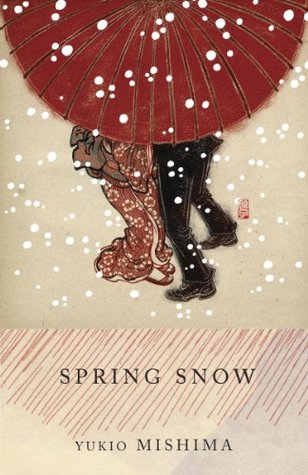More on this book
Community
Kindle Notes & Highlights
WHEN CONVERSATION at school turned to the Russo-Japanese War, Kiyoaki Matsugae asked his closest friend, Shigekuni Honda, how much he could remember about it.
And Kiyoaki, like an ant that senses the approaching flood, was experiencing the first intimations of his family’s rapid collapse.
Without meaning to undermine his family, without wanting to violate its traditions, he was condemned to do so by his very nature.
The only thing that seemed valid to him was to live for the emotions—gratuitous and unstable, dying only to quicken again, dwindling and flaring without direction or purpose.
Yet Kiyoaki remained convinced that at the bottom of this world, which was like a leather bag filled with water, there was a little hole, and it seemed to him that he could hear time leaking from it, drop by drop.
At twenty she had passed the stage that was popularly supposed to mark a girl’s greatest beauty, but she was still unmarried.
But my trouble is that I’m always at a disadvantage since I’m not bold enough to let people know bluntly how I really feel.
For everything sacred has the substance of dreams and memories, and so we experience the miracle of what is separated from us by time or distance suddenly being made tangible. Dreams, memories, the sacred—they are all alike in that they are beyond our grasp. Once we are even marginally separated from what we can touch, the object is sanctified; it acquires the beauty of the unattainable, the quality of the miraculous. Everything, really, has this quality of sacredness, but we can desecrate it at a touch. How strange man is! His touch defiles and yet he contains the source of miracles.”
Everything about these lively young princes from the tropics—their brown skin, the flashing virility in their eyes, their long, slender, amber fingers, already so experienced in caresses—all this seemed to taunt Kiyoaki: “What? At your age, not even a single love affair?”
In all seriousness, for example, they might recall the night when two moons had appeared at the window, one of them a badger in disguise who immediately resumed his normal shape on being roundly abused, and lumbered away.
The study of law was certainly a strange discipline. It was a net with mesh so fine as to catch the most trivial incidents of daily life, yet its vast extension in time and space encompassed even the eternal movements of the sun and stars. No fisherman seeking to increase his catch could be more greedy than the student of law.
For Honda’s look was eloquent proof of Kiyoaki’s concept of friendship, which never demanded an excess of honesty.
Since early childhood, all that he had been taught to revere as honorable and beautiful was to be found, as far as the Matsugaes were concerned, in the proximity of death.
Men think only of money and women. Men have forgotten everything that should be becoming to a man.
Chance is the one final irrationality acceptable to the free will.
“Well, sir, in the first place, they seem to have been ignored by the poets, d’you see. And what has no place in a poem has no place in my house. That’s my family rule.”
He was like a husband so jealous that he insists his wife have the very dreams he has.
Those who lack imagination have no choice but to base their conclusions on the reality they see around them. But on the other hand, those who are imaginative have a tendency to build fortified castles they have designed themselves, and to seal off every window in them.
For the average man, driven as he is by lurid fantasies, there is almost nothing more deliciously titillating than the contemplation, from a safe distance, of evil laid out in its cause and effect.
Once passion was set in motion according to its own laws, then it was irresistible. This was a theory that would never be accepted by modern law, which took it as self-evident that conscience and reason ruled man.
They had no plans in mind, nothing to fall back on, no solution, no plan of action—and they felt that all this testified to the purity of their intentions.
For the first time in his life, he accepted raw ugliness as indeed being part of him.
He had come to realize that she was like those people who would tend their gardens scrupulously just for the pleasure of tearing up their flowers once they had bloomed.


